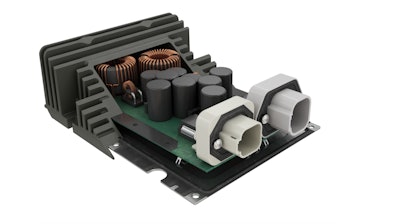
Vehicle electrification does not always have to mean range anxiety and expensive charging systems.
As Eaton reminded today, mild hybridization through a 48-volt system can reduce emissions and save fuel while avoiding range anxiety and the hunt for the next EV charger.
Carl Smith, commercial manager of sales, inside sales and applications engineering at Eaton, also pointed out that a 48-volt system doesn’t require costly lithium-ion batteries. Lead acid batteries, whether absorbed glass mat, traditional flooded or deep cell can be used to power accessories like fuel-thirsty air conditioning, lift systems, etc. on a broad range of hard working vehicles up to Class 8 long-haul tractors.
“We’re seeing a tremendous amount of interest [in 48 volt systems],” Smith said.
To help fleets transition to 48 volts, Eaton today introduced low-voltage power components for both commercial and off-highway vehicles. However, it’s best to let OEMs and suppliers handle the conversion.
“It's going to have to be OEM and supplier driven,” Smith said. “What I mean by that is in my opinion the OEMs and suppliers have to pull together to develop systems that work together as an integrated system on the vehicle because you've got starters, alternators, battery banks, cables, etc.
“You can test on a modified platform, but you would really need to design this for a ground up system to incorporate 48 volts,” Smith continued.
In addition to lowering fuel use and emissions, the advantages of using 48 volts versus 12 include smaller gauge wire which reduces cost, size and weight of wire harnesses and supporting components like the alternator. Challenges include the potential for an increase in faulty grounds and dangerous arcs.
Nonetheless, as fuel costs rise alongside emissions requirements, Smith sees growing interest for 48-volt hybridization including for trucks that use hydraulic equipment though not all vehicles are suitable for the transition.
“I don't think 48 volts will ever replace ground engaging equipment,” Smith said. “We just don't have the power to do it. However, there is a sweet spot where [48-volt] electric can replace hydraulic and that's in that 10- to 30-kilowatt range right now.
“A bucket truck is very similar to a scissor truck for what it's trying to do yet many of those, even though they may have electric motors, they're still running a hydraulic pump,” Smith continued. “So yes, those hydraulic lines and hydraulic pump can be now replaced with electric motors to do that lift function.”









